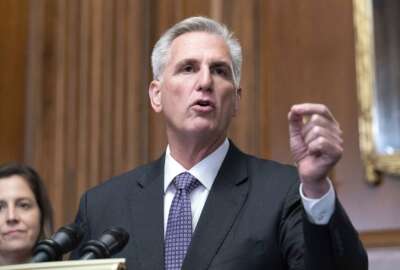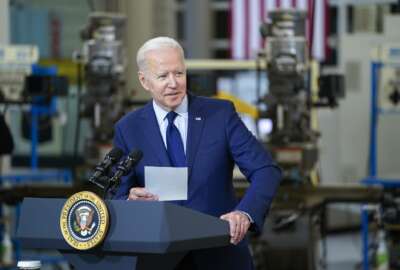
Should federal employees feel relieved by the debt crisis resolution?
Resolving the debt ceiling did get Congress a little closer to a 2024 budget deal. So what does it mean for your pay and benefits?
Resolving the debt ceiling did get Congress a little closer to a 2024 budget deal. So what does it mean for your pay and benefits? Federal Drive with Tom Temin checks in with John Hatton, the Staff Vice President, Policy and Programs at NARFE: the National Active and Retired Federal Employees Association.
Interview Transcript:
Tom Temin Now, there is no appropriations bills. They’re back to debating them now a little bit. So there could be something, a C.R. within three or six months of the actual beginning of the fiscal year ahead. Right. But what do you take away from this? What’s important here in terms of pay and benefits?
John Hatton Well, first of all, it was nice to see that there weren’t any cuts to federal benefits as pay fours to adjust the overall spending caps that they agreed to in these deals. So in the past, some of these kind of congressional budget deals, spending caps deals have been part of the negotiations, whether cuts to federal benefits, back in 2013 and 2014, there were increased contributions for new hires and the federal government. So they’re now paying more. That was part of one of these spending cap deals. The big headlines were over the debt limit being extended and us preventing default. But paired with that was an agreement for overall numbers on defense and non-defense spending, both in fiscal years 2024 and 2025. And so that will have implications for the appropriations bills that actually set the agency budgets. And there was a 3.3% increase in defense, I believe. There’s actually, in the bill, about a 5% decrease in non-defense spending from 2023. But it’s clear that there is some side deals with regard to some other budgetary authority clawback that would allow them to raise that non-defense figure to basically stay flat for the next year. Those are still tight numbers because you have to deal with inflation, federal employee pay raises and the like.
Tom Temin So therefore, if they’re tight numbers, it’s not going to affect really employees at all. It’s going to come out of acquisition budgets, grants budgets, information technology, that kind of thing.
John Hatton Likely. But it’s still possible for in the debate over appropriations for Congress to talk about what the federal pay raise would be. Now, in President Biden’s budget, it was that 4.7% across the board, or I think he calls it a 5.2% average with that 0.5% increase in locality pay. If Congress doesn’t say anything in the appropriations bills, that will go into effect. You would expect an alternative pay plan in August and then an executive order in December. But I wouldn’t be surprised if Congress or at least some in Congress, start talking about whether that would be the full number, because they will have these tight caps and if they want to avoid cuts in programmatic budgeting or if they’re in an appropriations bill that has heavy salary and expenses versus programmatic, I think it could be in play. My hope is that it’s not and that even if it is in play, that it still goes forward with what’s in President Biden’s budget.
Tom Temin That idea of years ago of increasing the employee contribution to the retirement funds and as you said, at some point, those hired after a certain date pay more in than those hired before that date. Have you heard anything from the Hill that anyone’s actually raised that one again? I haven’t heard that one lately.
John Hatton That might have been in the Republican Study Committee budget, not the Freedom Caucus, far right, but then the next level. More conservative, kind of more mainstream conservative group or caucus in the House had a few cuts to federal retirement benefits in there. I believe the increased contributions was in there, but I’d have to double check. So it’s still floating out there whether it might be equalizing it so employees pay half and the agency pays half. I think the normal cost is around 14 or 15%. So that would be going from that 4.4% to something like seven. Even right now, that’s a big chunk out of your paycheck. And the benefit now on FERS is still that much lower benefit. And so it takes a while for your contributions to actually result in a valuable pension.
Tom Temin Right. Yes. So that means that you are forced in some sense to set aside more for your TSP because that’s going to be a bigger part of your package, so to speak, when you do retire.
John Hatton Yeah. If you’re taking out 6.2% for payroll taxes, 4.4% for the new higher contribution, and you want to add five or 6% on TSP, you’re taking a huge chunk out of your paycheck before you even hit income taxes. So there are a lot of upfront costs to saving for retirement in the federal system, and you’d come out with a nice package of Social Security and FERS and TSP, but you’re putting in a lot of money into those systems.
Tom Temin And at the senior levels, listen, they don’t leave government and retire fully very often. I mean, a lot of people take a second job in the private sector. Sometimes they do really well. That pension is kind of a cushion. We’re speaking with John Hatton. He’s vice president for policy and programs at the National Active and Retired Federal Employees Association. And I guess the other thing we could talk about here is whether this deal on the debt averts the idea of a shutdown, since they do have the caps and presumably there’s a number that’s going to be appropriated and maybe less chance of a shutdown, even if there’s a C.R.?
John Hatton Yeah. So I think it does lessen the chance of a shutdown. One of the elements of this deal is this automatic 1% decrease in spending or kind of a sequestration that would happen if Congress passes a C.R. and does not actually pass those appropriations bills by January 1st. So I don’t know why they didn’t make the deadline the start of the fiscal year, but they didn’t. The deadline for them is really January 1st, which they typically, not always, but often passing those appropriations in December. So I think there will be a big push from defense hawks in Congress to avoid that, because instead of getting that 3.3% increase in defense, which some people were already upset about, there’d be a 1% decrease. And so there’ll be a number, I think, of defense hawks pushing on the Republican side to make sure a bill goes through. Is it guaranteed? No, but I think there are political pressures and a system set up that lessens the threat of a shutdown.
Tom Temin All right. So what else do people need to know about this deal and what do they need to know about what’s likely to happen to them next year, federal employees?
John Hatton Well, I think it was nice to see in the deal that the threat of default was taken off the table until 2025. So we have some time to go for that. Like I said, we have to pay attention to what Congress is doing on the federal pay raise because that’s potentially still up in the air. And then just what other agency budget levels are set could affect people’s job spending. And and it’s not there were pretty big increases in agency budgets in 22 and 23. So staying flat or going up a little bit, maybe the agencies have some room there, but it is going to be flat or down on the nondefense side and a small increase on defense. So.
Tom Temin All right. And speaking of legislation and legislative process, you guys have a training conference and Advocacy Day. Yeah, I didn’t realize federal employees could do that kind of thing. Advocate on behalf of legislation.
John Hatton You can. There’s the Hatch Act, but that sets limits on what you can do on the political sphere in terms of campaigning or running for elected office. But as a citizen, you have the right to lobby or talk to Congress about things that matter to you, and that could include things like your pay and benefits as a federal employee or a retiree. So it’s an essential part of what we do at NARFE and what other employee management union groups do is get people involved to be advocating on their own behalf. And so we have a biennial legislative training conference. So we have people come in, we have a few members of Congress talk to them, have a couple kind of training sessions like how to prepare for those meetings, how do you do them, what are the issues we’re talking about? And then we set up meetings with members offices and we’ll have 200 plus meetings with members of Congress set up with our members. And so it really has an effect on making sure your representatives are looking out for your interests as a federal employee and retiree, that they’re not cutting benefits. They really need to hear directly from the people affected for that to have an impact.
Tom Temin In your experience, what makes a member of Congress listen to one group or another? How do you get their attention? And I guess my second question is, is it possible for them to ever listen to an individual that’s well informed but maybe not part of an organized group?
John Hatton Yeah, On the individual level, I think you need to have some expertise on an issue for that to have an effect. And certainly as an individual, you’re part of another group of individuals. So a lot of people see something in the news and are upset about it and call in while you as an individual can have that effect. If it’s not just you, it’s a hundred people, 200 people, a thousand people calling into an office in terms of groups and different people. I think if you’re able to get in and have that face to face contact, have several points of contact with the member, show that you’re providing some valuable resources and facts, but also that you may be, for our members that are going here, they’re mostly our officers. So they’re not only are they going there and talking for themselves, but they’re talking for the people who are in their chapters, in their federations. They’re then a conduit for information to then tell everybody in their local district that, hey, I met with this member of Congress, they’re doing this on the bill. They’ve supported our bill here or they don’t on that. So there’s certain members that are probably not going to agree with us or not support some of our issues. But there’s plenty that are open minds and it also depends issue to issue. So some people might be open on supporting repeal of weapon GPO, but they might also want to cut federal benefits. So it’s interesting.
Tom Temin Tell us more about what happens at your particular conference in training. Is it open sessions and where does it take place and what do people need to know there?
John Hatton Yeah, so this one is virtual. We’ve had in-person before, but we had a successful virtual one last time and reduces some travel costs and things like that. We have an open general session where we get opening remarks, some update generally on what we are doing on our issues. We’ll have members of Congress will have like a grassroots advocacy expert in our general sessions. We’ll have a congressional staff panel where the staffers talk about their perspective, dealing with constituents from the district office perspective, the personal office perspective, the committee office perspective. And both sides, both chambers in both parties. And then we have these breakout sessions where we talk about how to prepare for these meetings, what you can do outside of this particular advocacy day, and then also talk about our political action committee, too.
Copyright © 2025 Federal News Network. All rights reserved. This website is not intended for users located within the European Economic Area.
Tom Temin is host of the Federal Drive and has been providing insight on federal technology and management issues for more than 30 years.
Follow @tteminWFED





